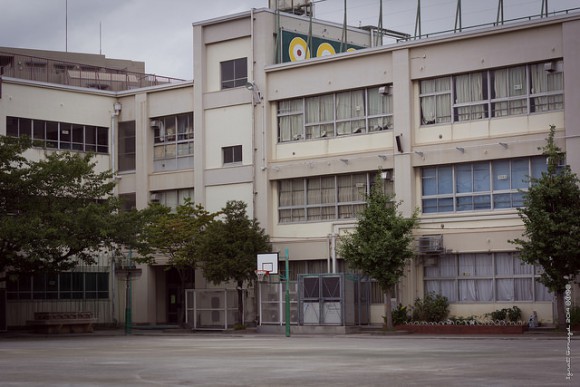
Ijime, or bullying, is sadly as much a part of Japanese school life as it is in any other country. In Japan, too, each school has a sort of social hierarchy, where the “cool kids” often pick on or exclude the nerdy/unsporty kids, and everyone gets shuffled around until the “stronger” kids are on the top and the “weaker” kids are on the bottom.
But in a society like Japan, where group mentality is so important, you’d be mistaken for thinking that after high school everyone just flutters off to become their own special snowflake and cast off the mental wounds of a tough adolescence.
In other words, if someone was bullied in school, there’s a chance they’ll keep on being bullied by the same people right on through their working days if they stay in the same town. So how does this “high school hierarchy” continue to affect the lives of adults in Japan?
This particular topic recently gained attention when sociologist Taiji Yamauchi began a debate on Twitter. Mr Yamauchi, who has conducted research at over 773 university campuses in Japan, postulates that those who were on the lower end of the social spectrum during their middle and high school days are significantly less likely to return to their home towns once having left. In the same way, hard-working students are more likely to move away for work in the first place in order to escape from the social system in which they were typecast as the “losers”.
私が18歳まで住んでいたような地方都市だと、中学校でのスクールカーストが、一生続くんですよ。大人になっても。だから、中学で勉強ができた大学進学者は、居心地が悪くて帰って来ません。仮にUターンして市役所やJAや信用金庫で働いても、地域活動だと中学のスクールカースト下位が復活です。
— 山内太地『やりたいことがわからない高校生のための 最高の職業と進路が見つかるガイドブック』3刷 (@yamauchitaiji) March 7, 2015
Mr Yamauchi also suggests that, regardless of ability, people who were on the lower rungs of the social ladder at school will still suffer the effects of high school bullying even if they return and manage to get a good job in their hometown. The reason being that, in a work situation such as a city hall where many employees have been raised in the town, those who were part of the “upper class” at school will continue on in those same roles in the workplace, while any students from the “lower class” will struggle to get ahead.
In this kind of situation, it’s no wonder Japan’s young people are flocking to the big cities in order to reinvent themselves.
Describing what he refers to as a “school caste” system, Mr Yamauchi also remarks that academic ability isn’t necessarily a route to high school ostracization. Instead, he states that hard-working students fall into one of either two categories. Those who have good grades and are also good at sports are able to exist within the upper class, while those who have good grades and lack sporting ability are invariably relegated to the “lower class”.
Mr Yamauchi’s thoughts drew plenty of responses from Twitter users, many of whom were in agreement with his findings:
“This is eye-opening. I have friends who are still hung up on our middle-school days, and whenever we meet they bring the conversation back to that time and brag about how cool they were back then. It’s obvious my girl friends want to preserve that. I think it’s pathetic.”
“I can understand this. This is why I don’t like going back to my hometown. My parents are there, and it’s a beautiful area, but people’s attitudes don’t change. They turn their noses up at everyone who wasn’t ‘in’, even when they want something from them.”
“I think it’s unfortunately natural for relationships from school to carry on the way they were. That’s why people stay in Tokyo where [they went to university and] nobody’s going to bother them.”
“I completely agree with this. It was a huge relief for me to get out of my local community when I moved to a different high school. Then I went to university in Tokyo and now work there, but my parents are pressuring me to come back home – they don’t understand anything about the ‘school caste’ that’s still going strong in my hometown.”
“People who are still stuck in their high school glory days are unspeakably pathetic.”
While it’s interesting to consider the concept of a lingering “school caste system” as a possible factor in the increasing number of Japanese people leaving their home towns for big cities, we very much doubt this is a phenomenon that’s exclusive to Japan. After all, most of us know at least one person who peaked in high school and didn’t really go on to great things after that. To be honest, we’d rather take our chances in the big city too rather than wind up working for the people who were mean to us in high school…



 Tough-as-nails bullied Japanese schoolgirl stays home from school, but not because she was sad
Tough-as-nails bullied Japanese schoolgirl stays home from school, but not because she was sad High schooler “forced” to quit school sues Kumamoto prefecture for a single yen
High schooler “forced” to quit school sues Kumamoto prefecture for a single yen Japanese Twitter user’s sad memory of when school literally refused to look at bullying problem
Japanese Twitter user’s sad memory of when school literally refused to look at bullying problem Snappy as they look, Japanese school uniforms can be an extremely expensive hassle for parents
Snappy as they look, Japanese school uniforms can be an extremely expensive hassle for parents Starbucks Japan unveils new sakura cherry blossom collection for hanami season 2026
Starbucks Japan unveils new sakura cherry blossom collection for hanami season 2026 Viral Japanese cheesecake from Osaka has a lesser known rival called Aunt Wanda
Viral Japanese cheesecake from Osaka has a lesser known rival called Aunt Wanda Kyoto raises hotel accommodation tax to fight overtourism, travelers could pay up to 10 times more
Kyoto raises hotel accommodation tax to fight overtourism, travelers could pay up to 10 times more New Attack on Titan theme park attraction coming to Fuji-Q Highland
New Attack on Titan theme park attraction coming to Fuji-Q Highland Which convenience store onigiri rice balls are the most popular? Survey reveals surprising results
Which convenience store onigiri rice balls are the most popular? Survey reveals surprising results Why is Japan such an unpopular tourist destination?
Why is Japan such an unpopular tourist destination? Japan’s Self-Defense Forces take “radio calisthenics” to an interesting new level
Japan’s Self-Defense Forces take “radio calisthenics” to an interesting new level Who is this mysterious large man who’s suddenly showing up on giant signs in Japan?
Who is this mysterious large man who’s suddenly showing up on giant signs in Japan? Japan Extreme Budget Travel! A trip from Tokyo to Izumo for just 30,000 yen [Part 2]
Japan Extreme Budget Travel! A trip from Tokyo to Izumo for just 30,000 yen [Part 2] A Must-See Visual of Japan’s 2011 Earthquakes
A Must-See Visual of Japan’s 2011 Earthquakes Starbucks Japan releases first-ever Hinamatsuri Girls’ Day Frappuccino
Starbucks Japan releases first-ever Hinamatsuri Girls’ Day Frappuccino Japanese restaurant chain serves Dragon Ball donuts and Senzu Beans this spring
Japanese restaurant chain serves Dragon Ball donuts and Senzu Beans this spring Highest Starbucks in Japan set to open this spring in the Tokyo sky
Highest Starbucks in Japan set to open this spring in the Tokyo sky Japan Extreme Budget Travel! A trip from Tokyo to Izumo for just 30,000 yen [Part 1]
Japan Extreme Budget Travel! A trip from Tokyo to Izumo for just 30,000 yen [Part 1] Japan has only one airport named after a samurai, so let’s check out Kochi Ryoma【Photos】
Japan has only one airport named after a samurai, so let’s check out Kochi Ryoma【Photos】 Japan’s craziest burger chain takes menchi katsu to new extreme levels
Japan’s craziest burger chain takes menchi katsu to new extreme levels Japanese drugstore sells onigiri at pre-stupid era prices, but how do they compare to 7-Eleven?
Japanese drugstore sells onigiri at pre-stupid era prices, but how do they compare to 7-Eleven? Yakuzen ramen restaurant in Tokyo is very different to a yakuza ramen restaurant
Yakuzen ramen restaurant in Tokyo is very different to a yakuza ramen restaurant Tokyo Skytree turns pink for the cherry blossom season
Tokyo Skytree turns pink for the cherry blossom season Japan’s newest Shinkansen has no seats…or passengers [Video]
Japan’s newest Shinkansen has no seats…or passengers [Video] Starbucks Japan releases new sakura goods and drinkware for cherry blossom season 2026
Starbucks Japan releases new sakura goods and drinkware for cherry blossom season 2026 Foreigners accounting for over 80 percent of off-course skiers needing rescue in Japan’s Hokkaido
Foreigners accounting for over 80 percent of off-course skiers needing rescue in Japan’s Hokkaido Super-salty pizza sends six kids to the hospital in Japan, linguistics blamed
Super-salty pizza sends six kids to the hospital in Japan, linguistics blamed Starbucks Japan unveils new sakura Frappuccino for cherry blossom season 2026
Starbucks Japan unveils new sakura Frappuccino for cherry blossom season 2026 Foreign tourists in Japan will get free Shinkansen tickets to promote regional tourism
Foreign tourists in Japan will get free Shinkansen tickets to promote regional tourism The 10 most annoying things foreign tourists do on Japanese trains, according to locals
The 10 most annoying things foreign tourists do on Japanese trains, according to locals Take a trip to Japan’s Dododo Land, the most irritating place on Earth
Take a trip to Japan’s Dododo Land, the most irritating place on Earth Naruto and Converse team up for new line of shinobi sneakers[Photos]
Naruto and Converse team up for new line of shinobi sneakers[Photos] Is China’s don’t-go-to-Japan warning affecting the lines at a popular Tokyo gyukatsu restaurant?
Is China’s don’t-go-to-Japan warning affecting the lines at a popular Tokyo gyukatsu restaurant? Survey asks foreign tourists what bothered them in Japan, more than half gave same answer
Survey asks foreign tourists what bothered them in Japan, more than half gave same answer Japan’s human washing machines will go on sale to general public, demos to be held in Tokyo
Japan’s human washing machines will go on sale to general public, demos to be held in Tokyo Starbucks Japan releases new drinkware and goods for Valentine’s Day
Starbucks Japan releases new drinkware and goods for Valentine’s Day We deeply regret going into this tunnel on our walk in the mountains of Japan
We deeply regret going into this tunnel on our walk in the mountains of Japan Studio Ghibli releases Kodama forest spirits from Princess Mononoke to light up your home
Studio Ghibli releases Kodama forest spirits from Princess Mononoke to light up your home Major Japanese hotel chain says reservations via overseas booking sites may not be valid
Major Japanese hotel chain says reservations via overseas booking sites may not be valid Put sesame oil in your coffee? Japanese maker says it’s the best way to start your day【Taste test】
Put sesame oil in your coffee? Japanese maker says it’s the best way to start your day【Taste test】 No more using real katana for tourism activities, Japan’s National Police Agency says
No more using real katana for tourism activities, Japan’s National Police Agency says When bullying happens in Japan, should parents go to the police? We ask an educator
When bullying happens in Japan, should parents go to the police? We ask an educator American English teacher fired from Japanese high school after exposing genitals
American English teacher fired from Japanese high school after exposing genitals Public high school in Japan’s Gifu Prefecture will no longer take student absences into account for entrance applications
Public high school in Japan’s Gifu Prefecture will no longer take student absences into account for entrance applications Elementary and junior high students speak out on Japan’s strangest school rules
Elementary and junior high students speak out on Japan’s strangest school rules Japanese high school kendo coach caught forcing students to pay birthday-tribute money
Japanese high school kendo coach caught forcing students to pay birthday-tribute money Japanese convenience store opens new branch inside public high school【Video】
Japanese convenience store opens new branch inside public high school【Video】 Not everyone hates school uniforms: Japanese Twitter shows us why
Not everyone hates school uniforms: Japanese Twitter shows us why Japanese high school volleyball player beaten by coach, teammates for violating no-dating rule
Japanese high school volleyball player beaten by coach, teammates for violating no-dating rule The number of entrance exam takers at a top public high school in Okayama falls short, all pass
The number of entrance exam takers at a top public high school in Okayama falls short, all pass What event did you hate most in elementary school? Survey asks Japanese adults
What event did you hate most in elementary school? Survey asks Japanese adults Majority of Nagasaki high schools and middle schools have white-underwear-only rules, study finds
Majority of Nagasaki high schools and middle schools have white-underwear-only rules, study finds 5 reasons why Japanese expats say “sayonara” to their homeland for good
5 reasons why Japanese expats say “sayonara” to their homeland for good The reason why Japanese students don’t pronounce English properly
The reason why Japanese students don’t pronounce English properly Japanese schoolgirl says education is pointless, gets schooled in debate on Twitter
Japanese schoolgirl says education is pointless, gets schooled in debate on Twitter Japanese schools banning nicknames, mandating use of -san divides opinions
Japanese schools banning nicknames, mandating use of -san divides opinions Japanese TV issues heatstroke alert, says to avoid exercise, keeps showing high school baseball game
Japanese TV issues heatstroke alert, says to avoid exercise, keeps showing high school baseball game Abandoned school being used for foreign tourists to experience Japanese high school in Chiba
Abandoned school being used for foreign tourists to experience Japanese high school in Chiba